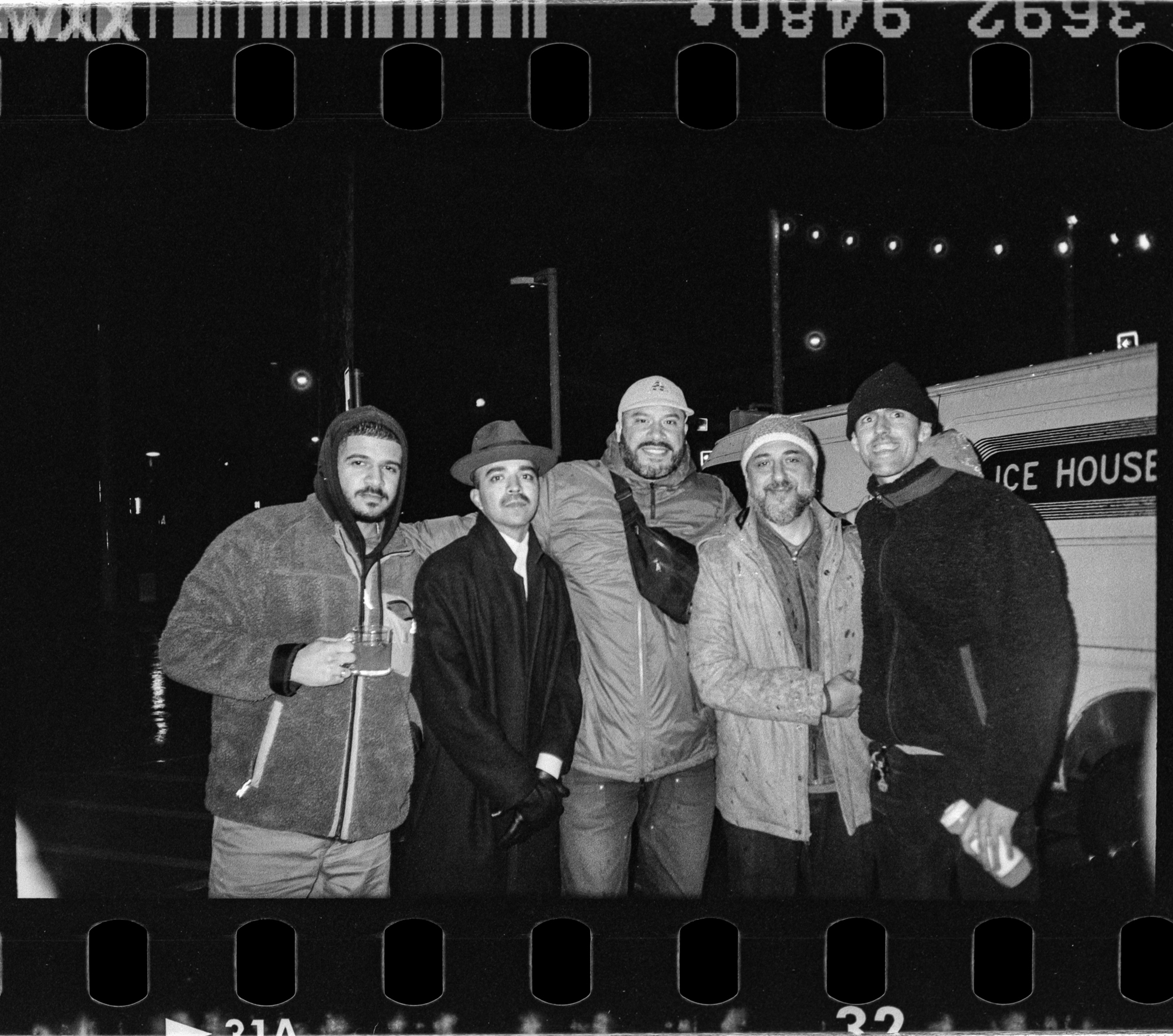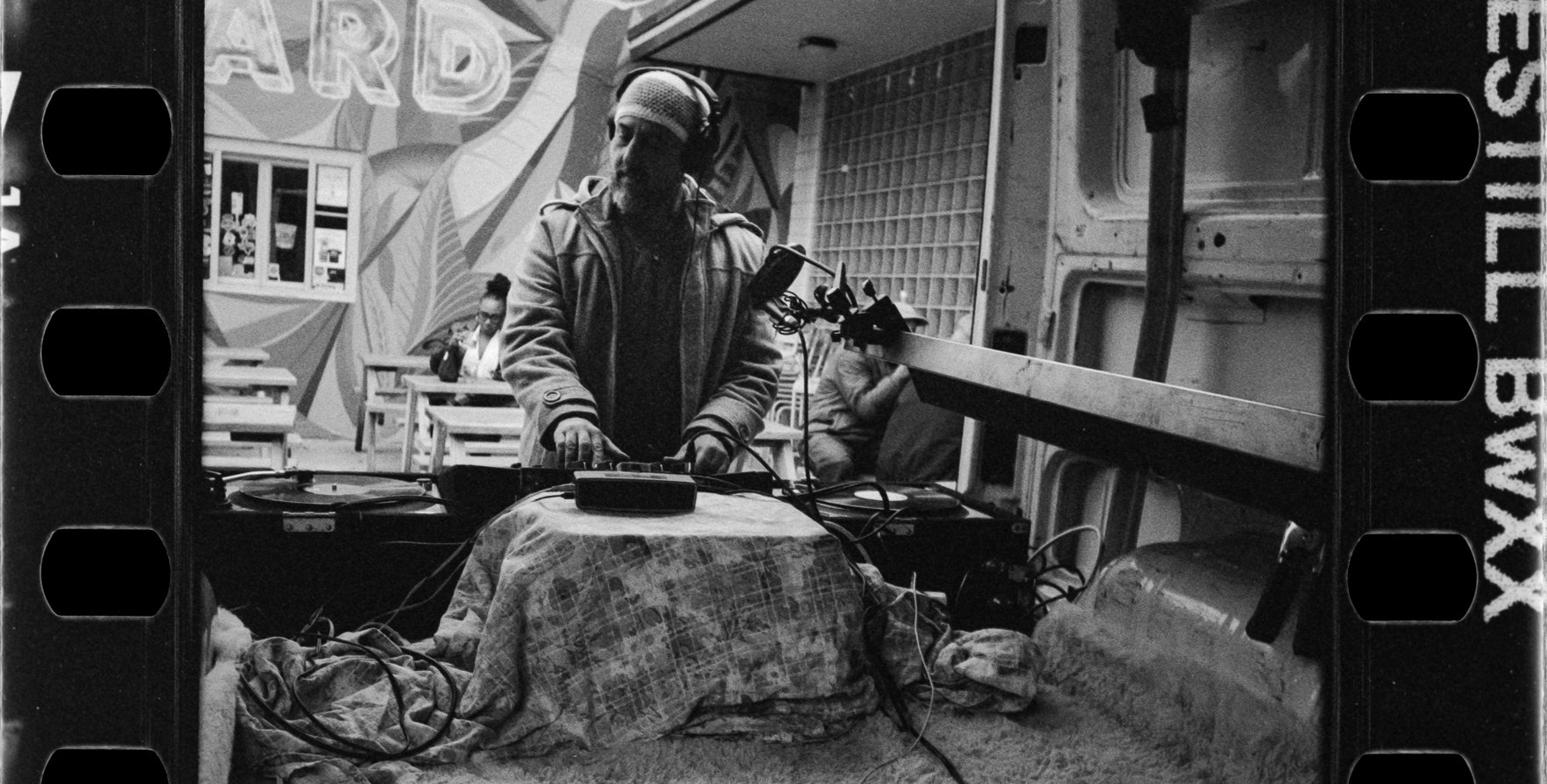Filmmaker, journalist, podcast producer, record collector, and DJ Jackson Allers has lived an eclectic life. The native Houstonian has trotted the globe, playing music and reporting from war-torn areas.
You might not expect this from a guy who’s generally known for spinning records as “Brother” Jackson Allers. He DJs a monthly, two-hour set called Sounds of Solidarity, which plays on an online Palestinian station, Radio Alhara, as well as Ice House Radio, a Houston-based web radio station he co-founded in 2023. “I wanted to incorporate all my different musical interests, from punk to ambient to outlaw country to hip-hop, jazz, whatever,” said Allers, during an October Zoom call from his Spring Branch home. “I needed a show that reflected my radical political beliefs and my desire to link all these different, disparate musical elements under one umbrella.”
Allers has loved music and broadcasting since growing up in the suburbs of north Houston, when he listened to Pacifica Radio station KPFT with his dad and took in “the diversity of weirdness and informational programming that was on that radio station. … That was my first exposure to zydeco and Cajun, and I just was, from early on, a lover of [community] radio,” he said.
As the son of an ethnically Armenian, Iraq-born mother (who passed away in 2009), Allers was taught at a young age to appreciate different sounds and cultures. “There was a rich cultural heritage that was ever present in the house, a genocidal history that also hipped me to social justice issues,” he remembered.

He got into radio while attending college on a golf scholarship. Doing a radio show on a college station was more fulfilling than golfing, which he quit after his freshman year. Allers then spent most of his college years in the fields of rural North Carolina, doing healthcare advocacy and union organizing with migrant farmworkers. He documented these experiences, taking photos and writing poetry. Although he was offered a job as a United Farm Workers organizer, he wanted to work in the media. “Someone needed to specifically figure out ways to amplify these things that I was experiencing,” he said. “And, so, I strangely decided that I should go to LA.”
Once in La La Land, he got to know the city’s Armenian community, studying Armenian history and language and hanging out with Armenian Angelenos who were deep into jazz and hip-hop. He struck up a friendship with a Pacifica radio station host, and the pair formed Working Class Productions in 1997, booking shows featuring acts that played the eclectic-but- soulful music they were into.
This is where the memories come flowing for Allers. As he flips through old fliers, he lists off some of the folks they booked. They brought in DJs like Cut Chemist, Prince Paul, and J Rocc to spin records. Poet Saul Williams performed a set that, according to Allers, inspired iconic producer Rick Rubin (who was in the audience) to sign him. They eventually got jazz legends like Terry Callier, Gil Scott-Heron, Les McCann, Eugene McDaniels, and Houston-born Horace Tapscott to perform.
“We decided to start bringing people in that we were inspired by, and we had this whole idea,” he recalled, “What if we went big and brought the godfathers, the roots of the music, out of the shadows?”
By 2000, a burned-out Allers moved back to Houston, where he began working at KPFT. “I really wanted to be doing more powerful work in terms of the media and decided that I would be a radio reporter,” he said. Along with multimedia investigative reporter Renee Feltz, Allers started the station’s news department in 2002. This set him on a reporter’s journey that took him to New York and Eastern Europe, to the Republic of Kosovo, where he produced radio content for the United Nations, before moving to Lebanon in 2006.
“I was compelled to go to Lebanon because I’d heard about it all my life in Houston growing up from Lebanese Armenians and Lebanese Syrians,” he said. As a 34-day conflict between Hezbollah and Israel unfolded in Lebanon that same year, he became a war reporter, filing dispatches for Free Speech Radio News and the BBC.
But he also got into the underground music scene, learning more about Arab and Lebanese hip-hop and doing radio pieces about those subjects as well. He eventually became a part of the vinyl-only DJ crew Beirut Groove Collective and served as the managing editor for the hip-hop news and culture website World Hip Hop Market. “I felt such hope, as did everybody else,” he said. “I was just so blown away by the politicized nature of the population, how aware they were about the world and even U.S. history and how incredible the music scene was.”
This was all before he suddenly had to get out. In his telling, he made an enemy “on the Christian right in 2018,” someone who wanted to kick Allers out of Lebanon for working illegally. “I won’t get into the details, but I made him very angry,” he said. This led to a series of events that ended with Allers barred from the country and returning to his Texas hometown in 2022 to take care of his ailing father (who passed away the following year).
Nowadays, when Allers isn’t going around the country designing and producing podcasts for people, he’s expanding Ice House, which used to operate from a Sprinter van but now broadcasts live, Wednesdays through Fridays, from an art space (and former car wash) below the Montrose bar and music venue Echoes.
Allers is still working on getting back to Beirut, where his record collection (about 1500-2000 LPs) sits in his old home. Though the death and destruction Israel recently brought on a daily basis has stopped directly threatening the capital city (at least as long as a late-November ceasefire holds), he’s well-aware of what could await him and of the impact of the broader conflict.
“I saw what a military occupation looks like and what apartheid looks like,” he said, recalling a trip he made to Palestine in 2002. “I was confronted firsthand with guns being pointed at me. It was just so sad and maddening.”
But he wants to go back to see how his people are doing during this horrific time. “There’s just so much that’s still there,” he said. “The people that I was living with … Lebanese and Syrian writers and artists … we’re in touch right now as Lebanon is being destroyed. Yeah, it’s not easy.”
Allers fights off the helplessness and hopelessness by raising awareness of what’s going on over there, whether it’s playing music online or on his daily Instagram stories. “I feel like I’m leading a schizophrenic existence witnessing friends and chosen family directly affected by all of this,” he said. ”I’m doing everything I can, helping out in whatever way I can.”



